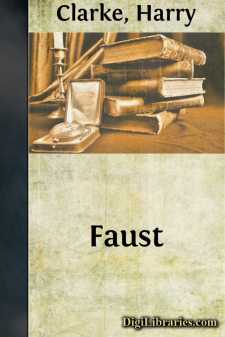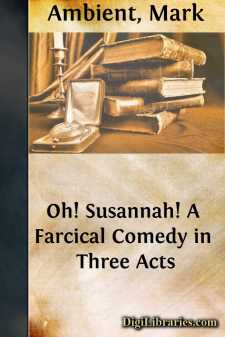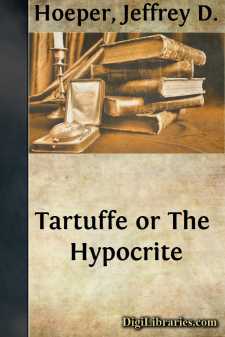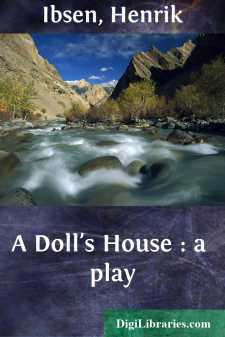Drama Books
Sort by:
Act I. Scene I.—Salem Village. Living-room in Giles Corey's house. Olive Corey is spinning. Nancy Fox, the old servant, sits in the fireplace paring apples. Little Phœbe Morse, on a stool beside her, is knitting a stocking. Phœbe (starting). What is that? Oh, Olive, what is that? Nancy. Yes, what is that? Massy, what a clatter! Olive (spinning). I heard naught. Be not so foolish, child. And...
more...
ACT I [Roadside with big stones, etc., on the right; low loose wall at back with gap near centre; at left, ruined doorway of church with bushes beside it. Martin Doul and Mary Doul grope in on left and pass over to stones on right, where they sit.] MARY DOUL. What place are we now, Martin Doul? MARTIN DOUL. Passing the gap. MARY DOUL — [raising her head.] — The length of that! Well, the sun's...
more...
by:
Eugene O'Neill
SCENE I SCENE—The firemen's forecastle of a transatlantic liner an hour after sailing from New York for the voyage across. Tiers of narrow, steel bunks, three deep, on all sides. An entrance in rear. Benches on the floor before the bunks. The room is crowded with men, shouting, cursing, laughing, singing—a confused, inchoate uproar swelling into a sort of unity, a meaning—the bewildered,...
more...
Act I. A Representation at the Hotel de Bourgogne. The hall of the Hotel de Bourgogne, in 1640. A sort of tennis-court arranged and decorated for a theatrical performance. The hall is oblong and seen obliquely, so that one of its sides forms the back of the right foreground, and meeting the left background makes an angle with the stage, which is partly visible. On both sides of the stage are benches....
more...
by:
Harry Clarke
I Erhabener Geist, im Geisterreich verloren! Wo immer Deine lichte Wohnung sey,Zum höh'ren Schaffen bist Du neugeboren,Und singest dort die voll're Litanei.Von jenem Streben das Du auserkoren,Vom reinsten Aether, drin Du athmest frei,O neige Dich zu gnädigem ErwiedernDes letzten Wiederhalls von Deinen Liedern! II Den alten Musen die bestäubten KronenNahmst Du, zu neuem Glanz, mit kühner...
more...
by:
Charles Macklin
INTRODUCTION During his extraordinarily long career as an actor, Charles Macklin wrote several plays. The earliest is King Henry VII; or, The Popish Imposter, a tragedy based on the Perkin Warbeck story, performed at Drury Lane 18 January 1745/6 and published the same year. As the Preface states, it "was design'd as a Kind of Mirror to the present Rebellion"; and it provided the author...
more...
by:
Robert Dodsley
INTERLUDE OF YOUTH. CHARITY.Jesu that his arms did spread,And on a tree was done to dead,From all perils he you defend!I desire audience till I have made an end,For I am come from God aboveTo occupy his laws to your behove,And am named Charity;There may no man saved beWithout the help of me,For he that Charity doth refuse,Other virtues though he do use,Without Charity it will not be,For it is written...
more...
by:
Mark Ambient
ACT I. Scene. The Doctor's consulting room. Ground floor, 13 Marmalade Street, Pimlico. (See Scene Plot.) (Aurora. the slavey, discovered laying out Doctor's letters lovingly on his writing table; she kisses each one as she lays it down—all are in blue envelopes.) Aurora. They're all for 'im—the dear doctor. Won't 'e be pleased when 'e comes back and finds all...
more...
ACT ISCENE I Madame Pernelle and her servant Flipote, Elmire, Mariane, Dorine, Damis, Cleante Mme. Pernelle. Let's go, Flipote, let's go. I hate this place. Elmire. I can't keep up, you rush at such a pace. Mme. Pernelle. Peace, my dear, peace; come no farther.I don't wish to cause you any bother. Elmire. What duty demands, I insist on giving.But, mother, what has caused...
more...
by:
Henrik Ibsen
ACT I [SCENE.--A room furnished comfortably and tastefully, but not extravagantly. At the back, a door to the right leads to the entrance-hall, another to the left leads to Helmer's study. Between the doors stands a piano. In the middle of the left-hand wall is a door, and beyond it a window. Near the window are a round table, arm-chairs and a small sofa. In the right-hand wall, at the farther...
more...











